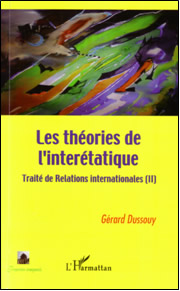Introducing Gérard Dussouy
 Dr Gérard Dussouy (1945, Saint Jean de Luz) has studied economics, geography and political science.
Dr Gérard Dussouy (1945, Saint Jean de Luz) has studied economics, geography and political science.
Currently, Mr Dussouy -who holds the French nationality- is professor in Geopolitics at the University of Bordeaux.
His third book in the series “Traité de Relations Internationales” -about globalisation- appeared in 2009.
Geopolitical Passport
Your relationship with geopolitics
At what age did you discover geopolitics and what attracted you to it?
I discovered geopolitics in the 1970s, initially as a potential explanation in the history of the empires.
Which geopolitical topics have your focus and why did you choose especially these?
Power, because the world space is organized by power (under its various faces). Politics would not exist without power.
What do you consider your most important contribution to geopolitics?
My concept of systemic geopolitics, I think, because it gives meaning to geopolitics, and allows it to overpass its original reductionist character (when classical geopolitics explains relationship between IR and physical geography).
My geopolitical preferences
What is your favourite definition of geopolitics?
Geopolitics is both a spatial ontology about the organization of the world and a hermeneutics of Globality. The goal of geopolitics is to analyse the world configuration formed by the interaction of the strategies of the actors in the space, and to interpret its possible evolution.
Which geopolitical scientist do you admire the most?
I have not one in particular.
What is your favourite geopolitical book?
I have not one. My preference goes to IR books.
My last favourite IR book is “System Effects. Complexity in Political and Social Life” (Robert Jervis, Princeton University Press, 1999).
The book shows why the world system is built by the interaction of the strategies. And why this interaction is difficult to evaluate.
What is your favourite geopolitical website?
ExploringGeopolitics, as it is really international.
Our geopolitical future
In what direction(s) will geopolitical science be heading the coming decades?
Multidimensional and systemic. I hope.
Which geopolitical subject has been too little in the spotlight and needs further research?
It is necessary to develop geoeconomics, geodemographics, geoculture, and especially to work upon the interactions, the interfaces.
What will be the largest geopolitical challenge for the world in the 21st century?
To understand and interpret the Globality, i.e. geopolitics needs to be transformed into a geopolitics of globality, and for that, tools need to be developed.

